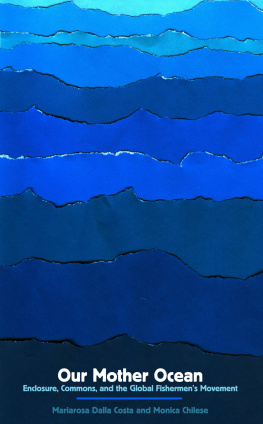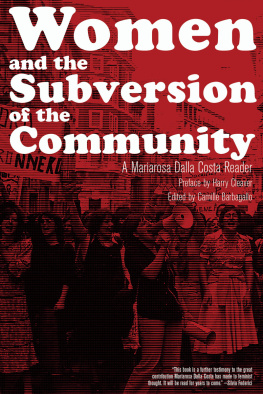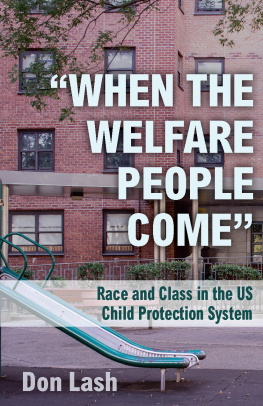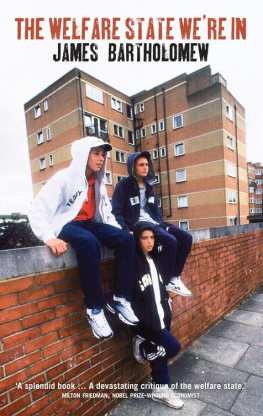PRAISE FOR FAMILY, WELFARE, AND THE STATE
For fifty years Mariarosa Dalla Costa has been the feminist conscience of autonomist, labor, radical, and workerist movements internationally. Ever since The Power of Women and the Subversion of the Community appeared in 1972, no one could reasonably engage in a revolutionary struggle against capitalism, and against the imposition of waged work, without due consideration to the power of women and unwaged reproduction of workers capacity to work. By placing welfare at the center of her analysis, Dalla Costa expands upon these initial findings while opening a new front against the racial and patriarchal order, and against the discipline of the state apparatus. A new edition of Family, Welfare, and the State provides a necessary opportunity to revisit her project, and hence, our own. Kevin Van Meter, author of Guerrillas of Desire: Everyday Resistance and Organizing to Make a Revolution Possible and Reading Struggles: Autonomist Marxism from Detroit to Turin and Back Again
The revival of Italian workerist and autonomist thought among the English-speaking left today makes Family, Welfare, and the State indispensable reading. In it, Mariarosa Dalla Costa offers an expansive notion of class autonomy and a compelling historical inquiry into the subjects of class struggle in the New Deal erawomen, Black workers, the unhoused, the unemployed, students, and othersthat is, the marginalized or too-often ignored reproductive elements that, complimentary to the productive sector, compose capitalist society and are just as indispensable to its subversion. Magally A. Miranda Alczar, cofounder of SALT: Xicana Marxist Thoughts and former editor at Viewpoint Magazine
This is the perfect moment to revisit Mariarosa Dalla Costas groundbreaking study. In the aftermath of a calamitous pandemic that dealt women a particularly devastating blow, the concepts of social reproduction and care work have finally entered the political mainstream. Family, Welfare, and the State brilliantly analyzes the conditions and ideology that shaped New Deal reforms, acutely alert to both their possibilities and limitations. This is essential reading as we push to continue the work of our radical feminist forebears. Astra Taylor, author of Remake the World: Essays, Reflections, Rebellions
Through the prism of working-class self-organization, Mariarosa Dalla Costa traces the historical development of the welfare state in the United States. She details the ways in which the family was instituted as the basic unit of social organization and the role bestowed upon women in the reproduction of labor power. Widening the lens, Dalla Costa maps the broader configurations of gender, race, and class that the welfare state was built upon to reveal its systematic exclusions. Family, Welfare, and the State is an important book for a time when we confront the fallout of neoliberal restructuring. Against nostalgia, the current challenge is not to return to the past, but to struggle for a better future. Emma Dowling, author of The Care Crisis: What Caused It and How Can We End It?
Mariarosa Dalla Costas landmark study of working-class struggles and the US state in the early decades of the twentieth century vividly illustrates how capitalist development passes through both family and home. The Great Depression, Dalla Costa argues, involved a massive crisis in the social reproduction of labor-power. She shows how militant movements by unemployed and employed workers prompted the New Deal state to intervene directly in the domestic sphere, inventing new norms for womens work along the way. This prehistory of the welfare rights and wages for housework movements will remain essential reading for activists and scholars in the twenty-first century and beyond. Andrew Anastasi, editor and translator of The Weapon of Organization: Mario Trontis Political Revolution in Marxism
Dalla Costas analysis of the New Deal is essential reading for contemporary theorists of racial patriarchal capitalism. Centered on the nexus of the state, the family, social reproduction, and popular struggles in a period of dramatic change, Family, Welfare, and the States historically situated argument feels prescient. Dalla Costas feminist analysis of the Keynesian prequel to neoliberalism, which attends to the crisis of waged work and social reproduction in the 1930s, is critically important to our present imagination ofand struggle againstneoliberalisms sequel. Kathi Weeks, author of The Problem with Work: Feminism, Marxism, Antiwork Politics, and Postwork Imaginaries
FAMILY, WELFARE, AND THE STATE
Family, Welfare, and the State: Between Progressivism and the New Deal
2015 Mariarosa Dalla Costa
Preface 2015 by Silvia Federici
Foreword 2021 by Liz Mason-Deese
Originally published in Italy as Famiglia, welfare e stato tra Progressismo e New Deal in 1997 by FrancoAngeli, Rome.
Translated from Italian by Rafaella Capanna
On Welfare (19771978) was originally published in Primo Maggio: saggi e documenti per una storia di classe 910 (19771978): 7680. It appears here in translation by Richard Braude and in Mariarosa Dalla Costas Women and the Subversion of the Community (PM Press, 2019). Reprinted with permission from PM Press.
This edition 2021 Common Notions
This work is licensed under the Creative Commons Attribution-NonCommercial-ShareAlike 3.0 Unported License. To view a copy of this license, visit creativecommons.org/licenses/by-nc-sa/3.0/
ISBN: 978-1-94217-353-3 | EBook ISBN: 978-1-94217-359-5
Library of Congress Control Number: 2021942966
Common Notions 314 7th Street Brooklyn, NY 11215 | Common Notions 210 South 45th Street Philadelphia, PA 19104 |
www.commonnotions.org
Cover design by Josh MacPhee/Antumbra Design
Layout design and typesetting by Morgan Buck/Antumbra Design
www.antumbradesign.org
Special thanks to Bryan Welton for editorial assistance.
Printed in Canada













